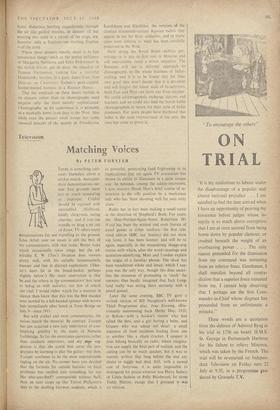Television
Matching Voices
By PETER FORSTER
THERE is something curi- ously blameless about a cricket. match. Anti-apar- theid demonstrations out- side Test grounds seem not so much nauseating as improper. Cricket should be equated with
untroubled childhood, kindly clergymen. eating cherries: and if you can trundle or drag a set out of doors, TV offers many compensations for not travelling to the ground. John Arlott over on steam is still the best of the commentators, with that rustic, Bruno voice which occasionally takes wings. but the ad- mirable E. W. ('Jim') Swanton does viewers• pretty well, with his suitable housemasterly manner and line in discreet euphemism. ('Dex- ter's been hit in the bread-basket, perhaps slightly below.') My main reservation is that he and the others in the commentators' box tend to befog us with statistics, too few of which are vital. I would rather watch for a moment in silence than know that this was the first maiden over bowled by a left-handed spinner with brown hair immediately after lunch at Trent Bridge on July 9—since 1911.
But with cricket and most commentaries, the voices match the material. By contrast. Tonight has just acquired a new lady interviewer of awe- inspiring gentility by the name of Nemone Lethbridge. So far she enunciates questions rather than conducts interviews, and my 10Vn sug- gestion is that she could best serve the pro- gramme by learning to play the guitar—but then. Tonight continues to be the most unpredictable ragbag on the air. No sooner have you decided that the formula for outside features on local problems has ossified into something far too like who-uses-Surf? commercials without Suil, than an item crops up like Trevor Phillpotts's visit to the duelling German students, which is
so powerful, penetrating (and frightening in its implications) (hat yet again TV journalism 'has shown its ability to illuminate in a quite unique way In between, among the oddity-interviews, I now treasure Derek Hart's brief course of in- struction in the rifle position by a marksman lady who has 'been shooting well for over sixty
years.' • Radio has in fact been making a small sortie in the direction of Shepherd's Bush. For years. the Muir-Norden-Spain-Arnot Robertson My Woid has been the wittiest and most literate of panel games in either medium—the first tele- vised edition (BBC last Sunday) did not show top form; it has been funnier, and will be so again, especially in the meandering shaggy-dog stories with which, after the word--meanings and quotation-identifying, Muir and horden explain tbe origin of a familiar phrase. The show has been transferred whole and intact, which I sup- pose was the only way, though this does under- line the nonsense of pretending to 'mark' the answers. One hardly imagined that Jack Long- land really was sitting there seriously with a pencil poised.
Later the same evening, BBC TV gave a revised version of Bill Naughton's well-known Third Programme play, June Evening, affec- tionately summoning back Derby Day, 1921, in Bolton—with a bookie's runner who had salted the bets, and a girl having a baby, and Granny who was asleep not dead: a small sequence of loud incidents leading from one to another like a chain cracker. I suspect it does belong basically on radio, where imagina- tion can supply the final part of realism, and the cutting can he so much quicker, but it was so warmly written that long before the end any desire to niggle had died. Still, with a named cast of forty-one, it is quite impossible to distinguish for praise whoever was Harry Sedwio or Lizzie Sedwin or Polly Hardwood, let alone Teddy Hulton, except that I presume it was no relative.






































 Previous page
Previous page